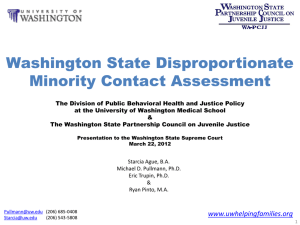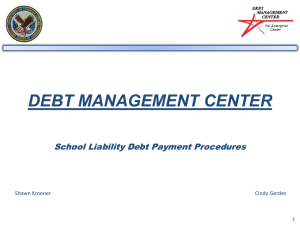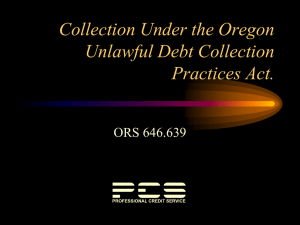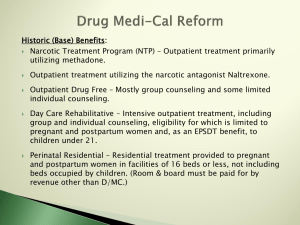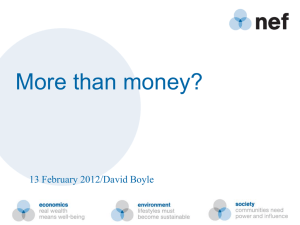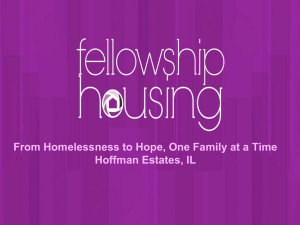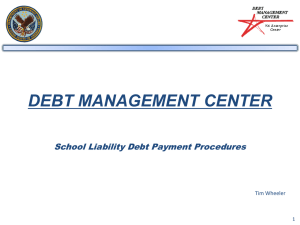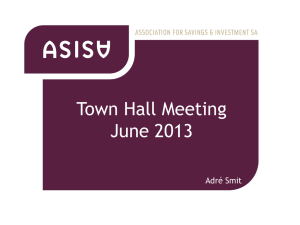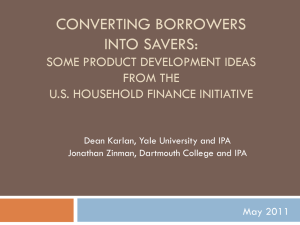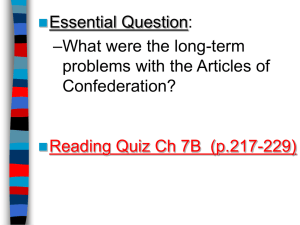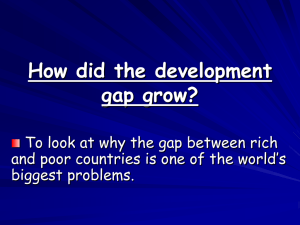DMC-VSO-Presentation-06-12-14
advertisement
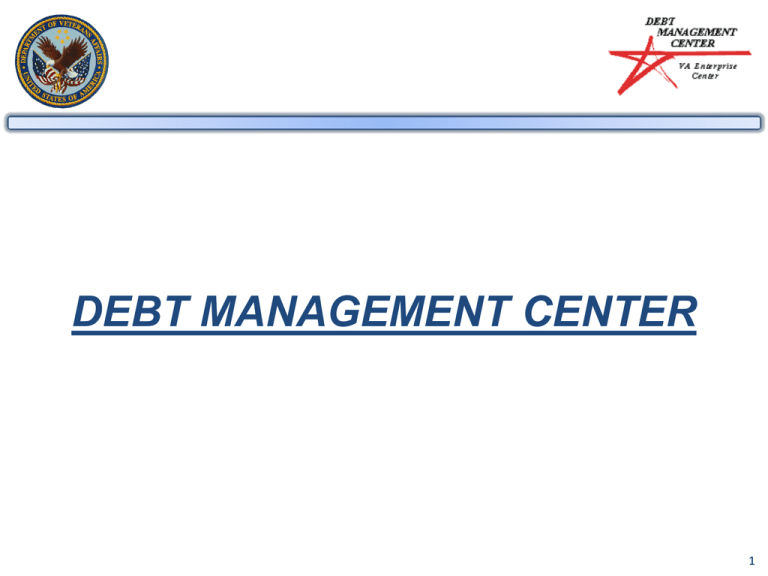
DEBT MANAGEMENT CENTER 1 DMC Mission Statement Our primary mission is to collect debts in the most efficient and cost effective manner possible while maintaining compassionate, high quality service to Veterans and their families. 2 Debt Management Center • Debt Management Center (DMC) was established in July 1991. • We are located with the VA Regional Office in St. Paul, MN • We provide debt collection services to the Veterans Benefits Administration (VBA) and the Veterans Health Administration (VHA). • We have jurisdiction over collection of overpayments for Compensation, Pension, Vocational Rehab, Education, and Home Loan Guarantee benefits. • We service approximately 479,000 accounts totaling 1.4 billion dollars. • Our office is staffed by 189 employees; almost half of our staff are Veterans. • 45 telephone operators answer about 2,200 phone calls per day. 3 Establishment of Debt • The process begins when the RO determines that there is a change in eligibility. – All debts are established at the VA Regional Office (RO) that has jurisdiction of benefits • Pension Benefits: Philadelphia, Milwaukee, & St. Paul • Compensation: all 57 Regional offices • Education: Buffalo, Atlanta, Muskogee, & St. Louis • The RO notifies the beneficiary of the possible change. The beneficiary is sent a letter and given 60 days to respond to the notice. – After 60 Days, if no actionable response is received, the proposed award action is taken and a debt is established. – A letter is sent to the beneficiary, notifying of the award change, the reason for the award change, and that the beneficiary has been overpaid. – This letter also informs them they will receive a separate notice from DMC with the amount of the overpayment and how to pay it back. 4 Why would an overpayment be established? • • • • • • Changes in income or net worth Return to active duty Failure to report changes in dependency Fugitive felon status or incarceration Withdrawal from or not passing classes Failure to obtain a Release of Home Loan Liability 5 Initial Debt Notification Once DMC receives a debt from the RO, the initial Debt Notification letter is mailed to the Veteran or Student – Address information comes directly from the RO or Pension Center. Veterans receiving benefit payments by direct deposit should always make sure to have current address information with the RO or PMC so they will receive all letters regarding changes to their benefits or a debt. – If the veteran is receiving benefits, the letter explains that we will automatically offset their benefits to apply toward the overpayment after sixty days, unless they contact DMC. – If the veteran is not receiving benefits, they are advised to contact DMC immediately to establish a repayment plan or repay the debt in full. 6 Notice of Rights and Obligations The initial debt notification also contains a form notifying the debtor of their rights and possible collection action that Debt Management may pursue. – Collections may be made by offset of government benefits, including Social Security and tax refunds. – The debtor has the right to dispute the existence or amount of the debt. – The debtor has the right to request waiver of the debt, and an oral hearing in connection with the waiver request. – The time limits to submit their request for waiver or dispute before benefits are withheld. – The debtor has the right to select a Veteran’s Service Organization to represent them during this process. 7 Requesting a Waiver The veteran may request a waiver of a debt if it is a financial hardship or if they feel they should not be held responsible for repayment of the debt – Waiver requests must be made in writing to the DMC, not the RO or Pension Center • The waiver request must state “I am requesting a waiver” and list the reasons why waiver should be granted. • Waiver requests must contain a completed VA Form 5655, Financial Status Report . – Once DMC receives the waiver request, the request will be forwarded to the Committee on Waivers for consideration. • If the waiver request is received within 30 days of the initial notification letter from DMC, collection will be suspended. 8 Waiver Timeframes • A Veteran has 180 days from the initial notification letter to request a waiver. • The Committees on Waivers will take approximately two to four months to make a decision on most waiver requests. – If it is granted, a notice will be sent to the Veteran by the DMC – If denied, a notice will be sent by the COWC – If denied, debtors have one year from the date of denial to file an appeal • Waiver requests must be received within 30 days of the initial notification letter from DMC for collection action to be suspended. 9 Withholding VA Benefits If the debtor is receiving VA benefits, he is advised in the initial notification letter that DMC will withhold those benefits until the amount overpaid is recouped. The letter will also advise when the withholding is scheduled to begin. – The full amount of the debt, or the entire monthly benefit will be withheld, whichever is smaller. The withholding will continue until the debt is paid in full. – If the debtor cannot afford to have the entire benefit withheld, they should contact the DMC as soon as possible. DMC will work with them establish a withholding that will accommodate their financial situation. – VA Form 5655, Financial Status Report, must be submitted for any withholding arrangement extending beyond one year. 10 Repayment Plans If a debtor is no longer receiving benefits and cannot pay the debt in full, DMC will work with them to establish a repayment plan. – The debtor should contact DMC as soon as possible to establish the payment plan – DMC can be contacted by phone, or the debtor may submit a payment plan in writing. – VA Form 5655, Financial Status Report, must be submitted for any payment plan extending beyond one year. – If DMC agrees to the payment plan, DMC will send a letter advising that the repayment plan has been accepted. If the payment plan is not accepted, the debtor will be advised of a repayment plan that will be acceptable. 11 Compromise Offer We can consider a lesser amount as full settlement a debt. This is referred to as a compromise offer. – To make an offer, a debtor should send a letter to DMC stating they are making a compromise offer and specify the amount they wish to pay. – A completed VA Form 5655, Financial Status Report, must be submitted for a compromise to be considered. – When DMC receives the offer, it will be referred to the Committee on Compromises for consideration. – If accepted, the debtor will be advised of the settlement terms. Compromise offers are normally paid in a lump sum within 30 days of acceptance. *** Payment should not be sent until the debtor receives a decision accepting the offer. *** 12 Making Payments Once a payment plan is accepted, a payment must be made to DMC every 30 days. – By Phone - Call us toll-free at (800) 827-0648. Payment can be made with a major credit card, debit card, or by electronic funds transfer from a checking or savings account. – By Mail - Send a check or money order payable to the “U.S. Department of Veterans Affairs” to DMC, PO Box 11930, St. Paul, MN 55111 – Online - Go to our website, www.pay.va.gov and click on “PAY NOW”. The payment can be made with a major credit card, debit card, or by electronic funds transfer from a checking or savings account. – Western Union Quick Collect - Payment can be sent from any Western Union location, or by visiting www.westernunion.com. The Western Union Website will require a host city code, which is “VADMC”. 13 What if a Repayment Plan is not made? If no repayment plan is established after 30 days from the date of the initial debt notification letter, a second letter will be sent requesting the debtor contact DMC. This letter will advise the debtor what will happen if no repayment arrangements are made in the next 60 days. 14 What if a Repayment Plan is not made? • The delinquent balance will be reported to Credit Reporting agencies. This will effect the ability of the debtor to obtain credit in the future. • The delinquent debt will be reported to the Credit Alert Interactive Voice Response System (CAIVRS). This will alert lenders of the debt with the VA and their delinquency will be considered in the underwriting process of any federal home loan. • The account can be referred to the Department of Treasury for further collection action, which will include offset of any Federal payments the debtor is entitled to. This includes tax refunds, social security benefits, and federal salary or retirement benefits. • The Department of Treasury may refer the account to private collection agencies, which will result in additional fees, interest, and penalties being added to the account as authorized under the Debt Collection Improvement Act of 1996. • The debtor may also be subject to garnishment of non-federal wages under Treasury’s Administrative Wage Garnishment Program. • Any future VA benefits will be withheld to satisfy the debt. 15 Contacting DMC by Phone DMC operates 192 toll free lines during our business hours, 7:30 AM to 6:00 PM Central Time. Call us toll free at (800) 827-0648 or for international callers 1-612-713-6415. – DMC averages 2,200 calls daily. Unless of an unusually high volume, Veterans should have the option to wait on hold or call back. – We experience our highest volume of calls on Monday, and the first week of every month. By avoiding these peak times, you will minimize your wait time. – For internal use by VSO’s only please call (612) 970-5737. This number is NOT to be shared with the Veterans. 16 Other Ways to Contact DMC • By mail: Department of Veterans Affairs DMC (389) PO Box 11930 St. Paul, MN 55111-0930 • Email: dmc.ops@va.gov • Internet: www.va.gov/debtman • Fax: (612) 970-5798 or (612) 970-5782 17 Questions 18

